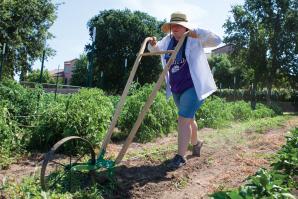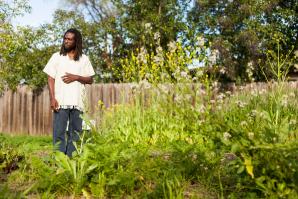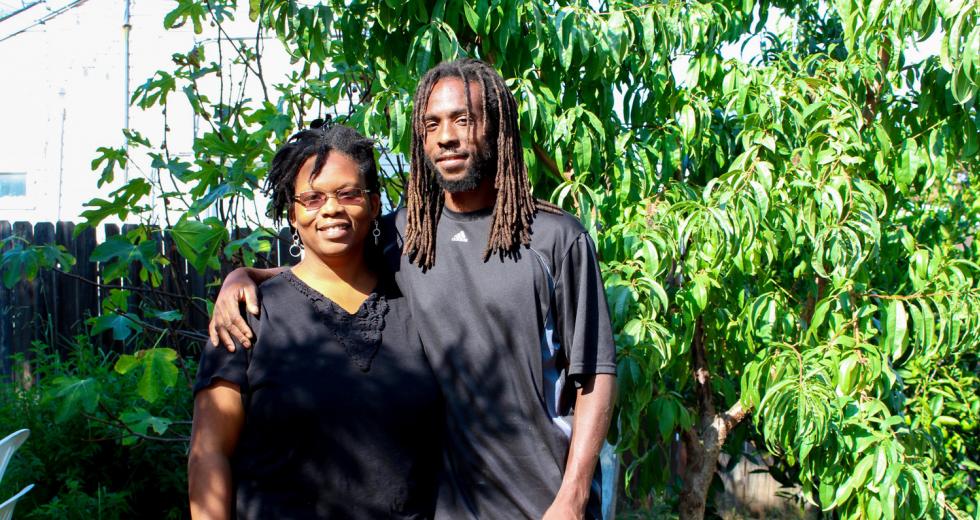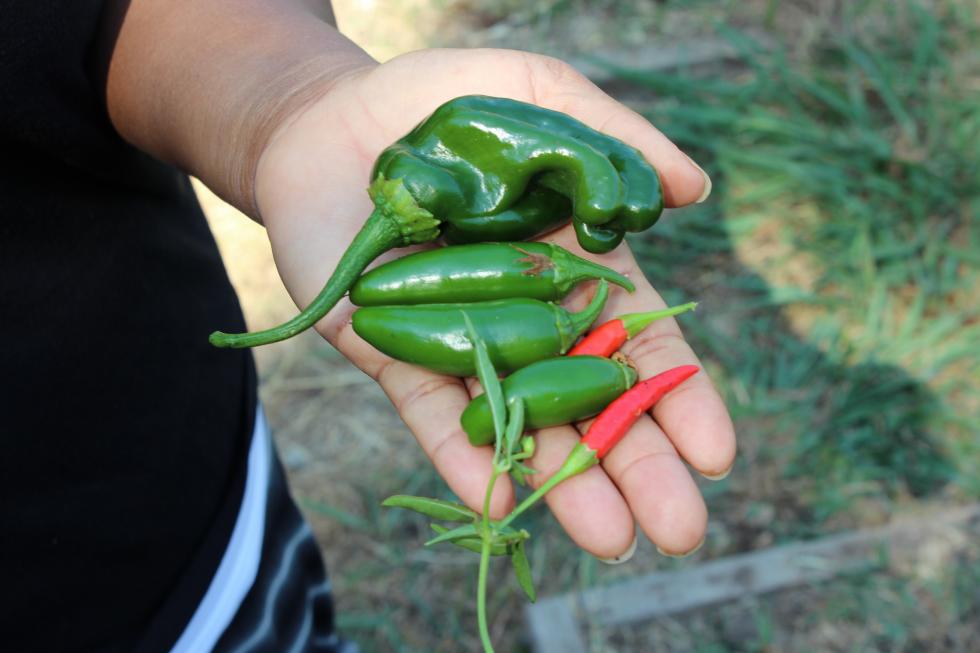Chanowk Yisrael wants to change the ‘hood for good. That’s his motto. But what does it take to truly transform a community through gardening? As a leader in the local food movement, Yisrael’s efforts are transforming more than his south Sacramento neighborhood. He’s influencing work in the heart of America’s Farm-to-Fork capital by building gardens and delivering urban agriculture education to youth and adults throughout the city. He’s also partnering with farmers across the globe as Slow Food Sacramento’s farm representative and board member at the nonprofit’s global conference in Italy, called Terra Madre.
Yisrael started his urban farm, Yisrael Family Urban Farm, eight years ago in response to health concerns within his family, and has since expanded his vision to become a business and to empower his community. “Why don’t people adopt urban farming?” Yisrael asks. “The answer: It’s actually real work. You’re gonna pick up a shovel, get cut, be sore the next day and we don’t associate that work with success.”
Yisrael isn’t afraid of real work, and it shows. Comstock’s talked to Yisrael about teamwork, leadership, courage and the role of art in garden education.
Related: An Interview with the ‘Gangsta Gardener’
When I start the compost class, I [ask] ‘What is composting?’ The best answer I ever got is that you take trash and turn it into treasures. So that process is the same process of transforming the ‘hood for good, taking that which has been written off as trash and applying the four forces of nature: courage, fire, air and water. Through that process, you come out with this new form that’s now giving life as opposed to something that somebody wants to throw away. When you start talking about ‘for good,’ it’s almost a pun. ‘For good’ means it will never go back to the way it was again. You can’t turn compost back into a leaf — it’s forever changed. It’s about relationships that are created because of the garden. You see social capital and value being created. The soil also creates a valuable product.
Yisrael Family Urban Farm is based in south Sacramento. (Photo
courtesy Cole Allen)

What leadership skills will it take to make an impact in the local food movement? How are you building these skills in others?
Courage. It’s going to take courage from the top down to invest in a new type of model. The biggest thing is how to make it sustainable; you have to invest in that. The first five years you’re learning all the ropes. People need to make those investments. It’s not going to happen in a programmatic funding cycle.
The second courage: when you try to step out of the status quo. Whether you’re in an underserved community and you say you’re going to start eating broccoli now. It will take courage because all your friends will tell you that you don’t have time for all that. ‘What will they look at me like if I’m in the garden? They’ll say I’m playing in the dirt.’ They’re communicating from this very small box that they’ve been put in and being able to expand horizons and step out of that takes a lot of courage. Just saying I’m going to get out there and work and load wood chips in cold, heat, sun beating down — those things develop character, which give you courage to go out and do things in the food movement.
Talk about teamwork. You and your wife, Judith, work very closely to make Yisrael Family Farms a success.
Let’s look at a garden. The tomatoes and the lettuce grow together. We have companion plants. The onions don’t get mad at the tomatoes. For this blob of lettuce and leaves in your compost to now be life-giving soil with nutrients — that’s teamwork. It’s about people knowing their roles and being able to put that together. We’re mostly successful as a species when we imitate nature. We have those examples around us all the time.
Can art and education cause change?
Absolutely. We all know the power of art-based therapy. Garden is art. An artist looks at a blank slate and then can imagine something beautiful. Youth are learning this. They can see an empty lot and they don’t see trash; they see sheet mulch. They’re getting the tools to reimagine their environment.
Education: Whoever you are as a person will be reflected back to you through your garden. People who say they have a brown thumb? You’re not willing to slow down and be patient with nature. What is necessary to create healthy, positive relationships? The educational piece teaches that, whether you become a farmer or not, whether you’re in the food movement or not, you can take that with you wherever you go.
You’ve talked about high school kids who don’t want to tell their friends they like to garden. What needs to happen to shift that culture?
Money. That’s the reason we give the children stipends. When he sees his friends, then he can reach in his pocket. Either way, I’ve got food and I’ve got money. I’m not just doing this for your passion … I still have a cell phone bill I have to take care of. When there’s money involved it will get youth refocused.
Why do you want to bring attention to urban gardening in Sacramento?
Because the narrative of what’s happening with urban agriculture in Sacramento and with the farm-to-fork movement … there’s an untold story about urban gardens. That story needs to be told.
Recommended For You

West Sacramento Clears Path for Urban Farmers
City’s agriculture movement shows value of farms to the larger community
The Center for Land-Based Learning launched the Urban Farm Program in 2014 on a city-owned lot and with seed funding from two local banks. Fiery Ginger uses land owned by the Washington Unified School District. Other farmers use private property, for four sites total, representing six separate farm businesses — with two more to be added by 2017

Sacramento Urban Farmer to Start Food Academy after Visit to Milan
South Sacramento urban farmer, Chanowk Yisrael, wants to see local food systems improve. Eight years ago, he started growing organic food for his family and eventually launched the Yisrael Family Urban Farm in Sacramento’s historic Oak Park neighborhood. Now, he’s expanding that vision to motivate Sacramento youth to become more engaged in changing our local food system — announcing today that he’ll be partnering with Slow Food Sacramento to charter the city’s first Food Academy.




